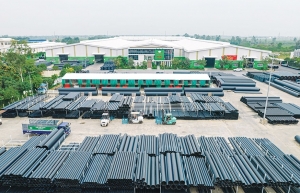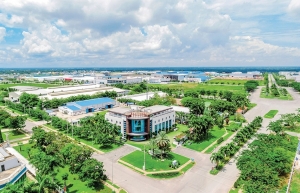Incentives can boost eco-IP ambitions
The decree adds various types of industrial parks (IPs), including specialised, high-tech, economic zones (EZs), and non-tariff zones within EZs. It also supplements regulations to clarify development support and cooperation policies, criteria for identification, incentives, certification, and procedures for registering eco-IP certification.
 |
| Vuong Thi Minh Hieu, deputy director Department for Economic Zones Management, Ministry of Planning and Investment |
At the same time, the decree specifically stipulates preferential policies for new types of IPs, including regulations on occupancy rate conditions not being applied when considering and approving investment policies for IPs proposed for development according to the new model.
Eco-IPs have become a selection criterion for foreign direct investors with the goal of sustainable development, where economic benefits align with community and societal responsibilities. According to the United Nations Industrial Development Organization’s assessment, Vietnam is one of the few countries worldwide that has successfully institutionalised the eco-IP model in decrees.
Vietnam has undergone two stages of developing eco-IPs, from the pilot phase in three localities (Ninh Binh, Danang, and Can Tho) during 2004-2009 to deploying replication in localities with many IPs (in Haiphong, Dong Nai, and Ho Chi Minh City) during 2020-2024, and continuing to replicate in other localities in the coming period to promote the national strategy on green growth, circular economy, and net-zero commitments.
From the perspective of state management, authorities overseeing IPs from central to local levels now understand the concept and benefits of converting and building new eco-IPs. For industrial infrastructure developers and secondary enterprises, understanding the government’s direction allows them to proactively build roadmaps and implement solutions to convert and build new eco-IPs according to their production and business strategies, thereby participating in global value chains.
Transitioning towards a green economy and circular economy in IPs is a solution to mitigate the effects of industrial activities on the environment, reduce resource waste, and promote sustainable growth. Enterprises in IPs are proactively investing, seeking, and implementing solutions for efficient resource use, cleaner production, and industrial symbiotic cooperation.
This can reduce input costs by utilising cheaper raw materials, lower operating costs, and enhance business competitiveness. Furthermore, quality and environmentally responsible products have a higher competitive advantage, especially in developed markets.
In the long term, converting traditional IPs to eco-IPs helps attract a new wave of high-quality investment. Developers are prioritised for support in information, science, and technology, creating conditions for exporting goods, promoting brands, and participating in value chains. They also have prioritised access to preferential loans from banks and financial institutions, as well as investment incentives.
However, the conversion from traditional to eco-IPs and the construction of new eco-areas face challenges such as missing and inconsistent guiding documents, particularly in regulations on reusing treated wastewater and waste in IPs, making it difficult to implement industrial symbiosis activities.
Additionally, the cost of conversion or building new eco-IPs requires significant investment capital and advanced technical solutions, while enterprise resources are limited. Therefore, it is necessary to mobilise resources from international organisations, business associations, climate finance funds, energy transition partners, commercial banks, and green financial institutions. Financial incentives should also be added to encourage businesses to convert and build new eco-IPs.
To replicate the eco-IP model, it is crucial to complete policies, with guidance from ministries and branches, especially for technical regulations and standards to implement industrial symbiotic networks and reuse waste and wastewater.
The Ministry of Planning and Investment (MPI) proposed to the government to consider developing a law on IPs and EZs, focusing on institutionalising the guidelines, policies, and orientations of the Party and state on building and developing them.
Additionally, the law would create a legal corridor with specific regulations on IPs and EZs to overcome the current limitation of lacking a particular law to regulate policies for developing new types of IPs and new functional areas in EZs.
The law will also supplement specific policies to support investment in IP and EZ infrastructure, such as order, procedures, and authority to invest in new types of industrial zones like free trade zones, non-tariff zones, and new EZs, to enhance the international competitiveness of these models.
Moreover, the law aims to improve the effectiveness and efficiency of state management of IPs and EZs according to the principle of “one-stop shop, on-site”; promote decentralisation; simplify administrative procedures; and improve the business investment environment in Vietnam.
The MPI will compile and disseminate the draft law for opinions once the proposal is approved for integration in the working agenda of the National Assembly.
 | The pros and cons of IP relocations There are many old industrial parks located in or near densely developed and populated urban areas in Vietnam that fail to provide adequate environmental protection. Timothy D. Van Epp, fellow of the American Institute of Certified Planners, and Mai Nguyen of the American Planning Association’s International Division, explain why new rules or incentives may be needed to implement the government’s relocation policy. |
 | Tien Phong Plastic: a master of greener standards As green real estate and eco-industrial parks have become more common, Tien Phong Plastic is at the forefront of offering solutions to align to those standards. |
 | Addressing the barriers to building eco-industrial parks Vietnam, a nation experiencing rapid industrialisation and economic growth, stands at a pivotal point in its developmental trajectory. Rizwan Khan, managing partner, at Acclime Vietnam, looks at the importance of sustainable development and the progress of implementing greener industrial areas. |
What the stars mean:
★ Poor ★ ★ Promising ★★★ Good ★★★★ Very good ★★★★★ Exceptional
Related Contents
Latest News
More News
- Sembcorp Development secures licence for VSIP in Khanh Hoa (December 31, 2025 | 18:54)
- Prodezi Long An advances towards integrated eco-centric industrial park model (December 26, 2025 | 11:16)
- Amata to develop $185 million Amata City Phu Tho (December 23, 2025 | 17:49)
- Work starts on Nhat Ban – Haiphong Industrial Zone Phase 2 (December 19, 2025 | 16:43)
- Becamex – Binh Phuoc drives sustainable industrial growth (November 28, 2025 | 15:22)
- South Korean investors seek clarity on IP lease extensions (November 24, 2025 | 17:48)
- CEO shares insights on Phu My 3 IP’s journey to green industrial growth (November 17, 2025 | 11:53)
- Business leaders give their views on ESG compliance in industrial parks (November 15, 2025 | 09:00)
- Industrial parks pivot to sustainable models amid rising ESG demands (November 14, 2025 | 11:00)
- Amata plans industrial park in Ho Chi Minh City (November 04, 2025 | 15:49)

 Tag:
Tag:




















 Mobile Version
Mobile Version